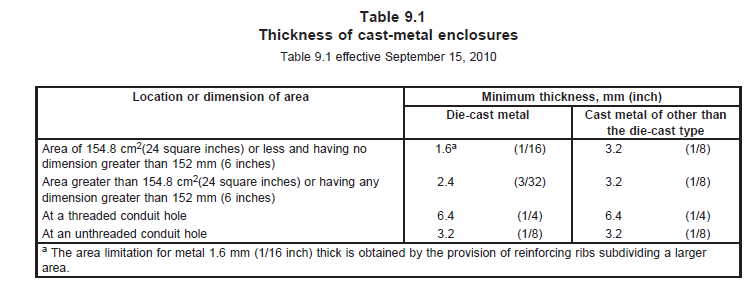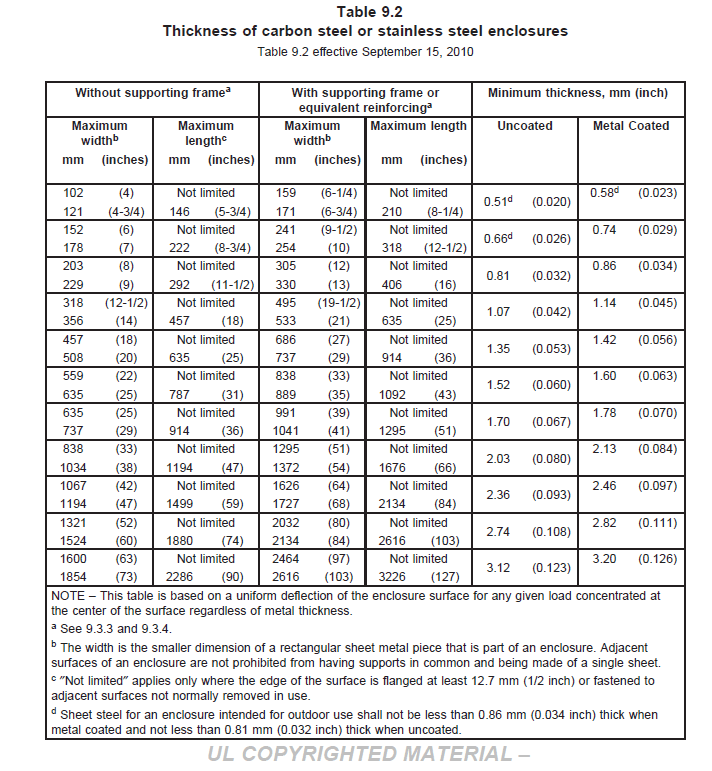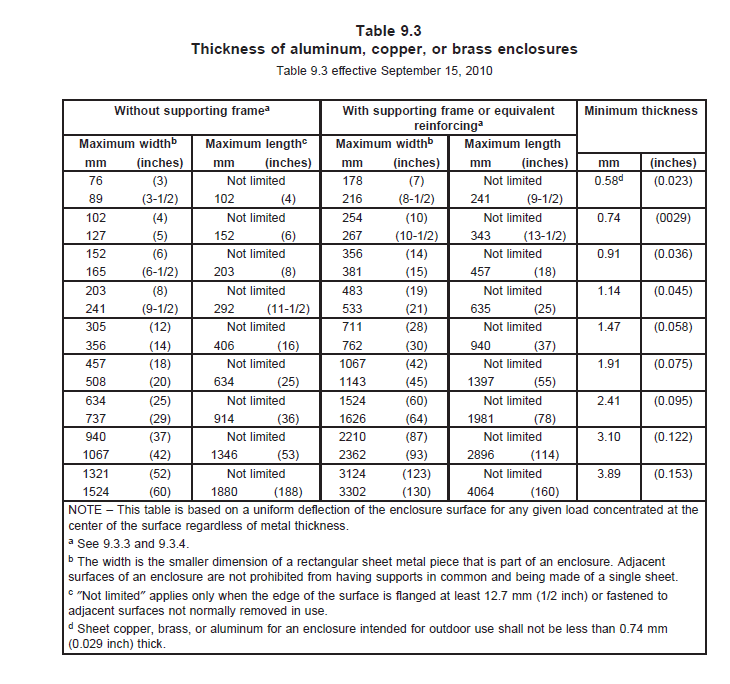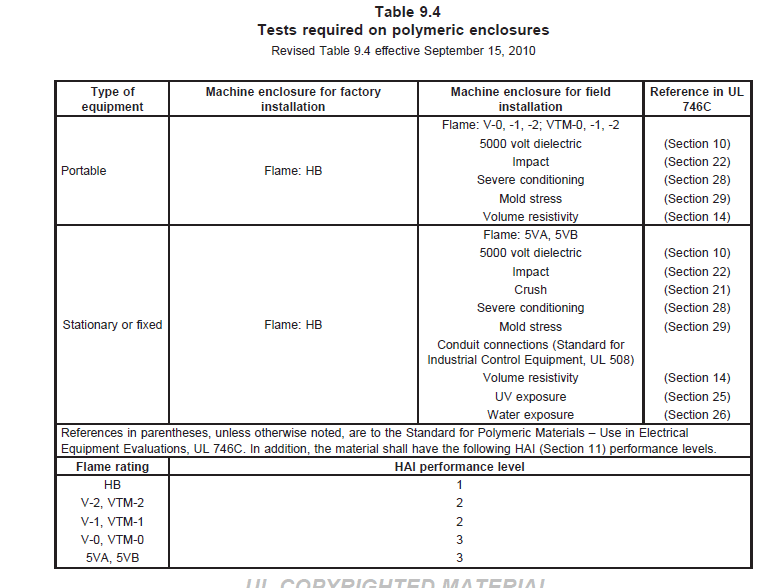
UL1004-1 Rotating Electrical Machines –General Requirements
First Edition – September, 2008
Second Edition -
September 19, 2012
9.1 General
9.1.1 A machine shall be formed and assembled so that it has the strength and rigidity necessary to resist
the abuses to which it is likely to be subjected, without increasing the risk of fire, electric shock, or injury
to persons due to total or partial collapse with resulting reduction of spacings, loosening or displacement
of parts, or other serious defects.
9.1.2 Among the factors taken into consideration when the acceptability of an enclosure is being judged
are its:
a) Mechanical strength;
b) Resistance to impact;
c) Moisture-absorptive properties;
d) Combustibility;
e) Resistance to corrosion;
f) Resistance to distortion at temperatures to which the enclosure may be subjected under
conditions of normal or abnormal use; and
g) Resistance to ignition from electrical sources.
9.1.2 effective September 15, 2010
9.1.3 Enclosures for machines that make use of oil as a cooling or insulating medium shall exhibit
sufficient structural integrity to contain the pressures produced by the expanding oil during abnormal
operation.
9.1.4 For a nonmetallic enclosure, 9.1.2 (a) – (g) shall be evaluated with respect to thermal aging. See
9.4 for polymeric enclosures and enclosure parts.
9.1.5 Acceptability of the size, number, and location of openings in an enclosure of a machine intended
for factory installation shall depend upon requirements for the end-use equipment. Among the factors that
are taken into consideration when the end-use equipment is being judged are:
a) Environment;
b) Degree of exposure;
c) Protection against unintentional contact with live parts, including film-coated wire; and
d) Prevention of expulsion of molten metal, burning insulation, flaming particles and the like
onto combustible materials, if applicable.
9.2 Cast metal enclosures
9.2.1 The thickness of cast metal for an enclosure shall be as specified in Table 9.1.
Exception: Cast metal of a lesser thickness is not prohibited when upon investigation (consideration
being given to the shape, size, and function of the enclosure) it is found to be mechanically equivalent for
the intended use.

9.3 Sheet metal enclosures
9.3.1 Sheet metal enclosures shall comply with 9.3.2 or the requirements in the Standard for Enclosures
for Electrical Equipment, Non-Environmental Considerations, UL 50.
9.3.2 The thickness of a sheet-metal enclosure shall not be less than that specified in Tables 9.2 and 9.3.
Uncoated steel shall not be less than 0.81 mm (0.032 inch) thick, zinc-coated steel shall not be less than
0.86 mm (0.034 inch) thick, and nonferrous metal shall not be less than 1.14 mm (0.045 inch) thick for
surfaces of an enclosure at which a wiring system is to be connected.
Exception: The thickness of a sheet metal enclosure may be less than specified in Tables 9.2 and 9.3
when investigated and determined to be mechanically equivalent.
9.3.3 With reference to Tables 9.2 and 9.3, a supporting frame is a structure of angle or channel or a
folded rigid section of sheet metal that is rigidly attached to and has the same outside dimensions as the
enclosure surface and that has the torsional rigidity to resist the bending moments that are applied via the
enclosure surface. An example of a construction that has equivalent reinforcement is one that produces
a structure that is as rigid as one built with a frame of angles or channels.
9.3.4 With reference to 9.3.3 and Tables 9.2 and 9.3, a construction does not have a supporting frame
when it is:
a) A single sheet with single formed flanges – formed edges;
b) A single sheet that is corrugated or ribbed;
c) An enclosure formed or fabricated from sheet metal; or
d) An enclosure surface loosely attached to a frame – for example, by spring clips.


9.4 Polymeric enclosures
9.4.1 A polymeric enclosure or a polymeric part of an enclosure shall comply with the applicable
requirements specified in the Standard for Polymeric Materials – Use in Electrical Equipment Evaluations,
UL 746C, and with the additional requirements specified in this Standard. See Table 9.4 for an overview
of the evaluation.
Exception: Thermoset materials used in a Class A machine are not required to comply with the mold
stress relief test.
9.4.2 Polymeric enclosures intended for field installation shall not deform under conditions of normal use.
See Section 32, Mechanical Tests.
Exception: A polymeric plug or other enclosure part less than 645 mm2(1 inch2) made of a material
classified in accordance with the Standard for Tests for Flammability of Plastic Materials for Parts in
Devices and Appliances, UL 94, and assembled to a sheet-metal or aluminum frame to form a part of an
enclosure is able to be used when the material is rated minimum V-2 or VTM-2, or rated HB and
complying with the 12 mm or 3/4-inch Flame Tests as specified in UL 746C.
